 Petzlover
Petzlover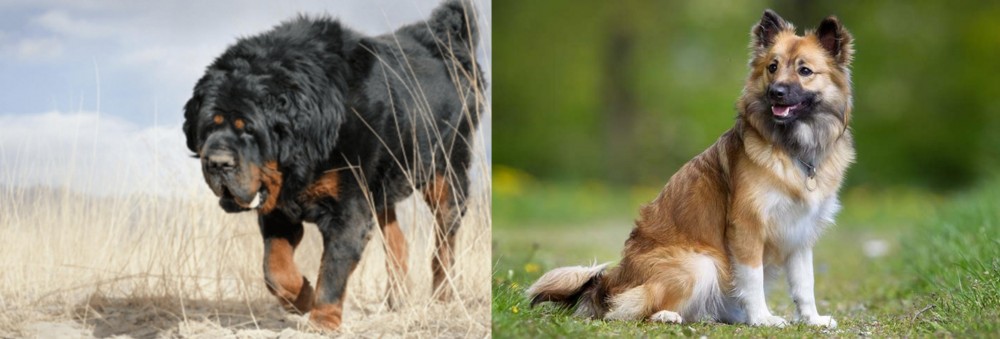 Gaddi Kutta is originated from India but Icelandic Sheepdog is originated from Iceland. Gaddi Kutta may grow 26 cm / 11 inches higher than Icelandic Sheepdog. Gaddi Kutta may weigh 30 kg / 67 pounds more than Icelandic Sheepdog. Both Gaddi Kutta and Icelandic Sheepdog has almost same life span. Gaddi Kutta may have more litter size than Icelandic Sheepdog. Gaddi Kutta requires High Maintenance. But Icelandic Sheepdog requires Moderate Maintenance
Gaddi Kutta is originated from India but Icelandic Sheepdog is originated from Iceland. Gaddi Kutta may grow 26 cm / 11 inches higher than Icelandic Sheepdog. Gaddi Kutta may weigh 30 kg / 67 pounds more than Icelandic Sheepdog. Both Gaddi Kutta and Icelandic Sheepdog has almost same life span. Gaddi Kutta may have more litter size than Icelandic Sheepdog. Gaddi Kutta requires High Maintenance. But Icelandic Sheepdog requires Moderate Maintenance
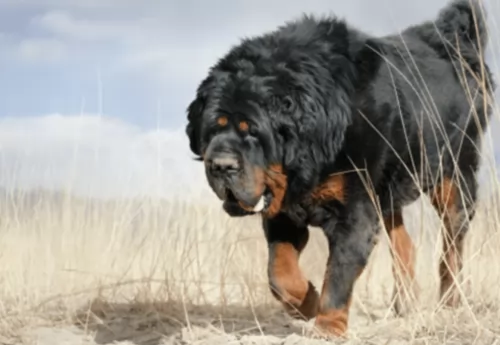 The Gaddi Kutta is mountain dog of the mastiff line from northern India. They are mostly found in the western Himalayas and Himachal Pradesh. It is also seen in Nepal and often named the Indian Panther Hound and the Mahidant Mastiff. They were bred to hunt but because of their strength and intelligence they are used to guard and herd goats and sheep. They are strong enough to defeat or scare off a panther or snow leopard and intelligent enough to work independently in finding strays and bringing them back to their pens. They have been known to protect herds of cattle from bears and leopards.3 or 4 of them working together can handle the guard duties for thousands of cattle.
The Gaddi Kutta is mountain dog of the mastiff line from northern India. They are mostly found in the western Himalayas and Himachal Pradesh. It is also seen in Nepal and often named the Indian Panther Hound and the Mahidant Mastiff. They were bred to hunt but because of their strength and intelligence they are used to guard and herd goats and sheep. They are strong enough to defeat or scare off a panther or snow leopard and intelligent enough to work independently in finding strays and bringing them back to their pens. They have been known to protect herds of cattle from bears and leopards.3 or 4 of them working together can handle the guard duties for thousands of cattle.
Their reputation precedes them – as ferocious and courageous, unmatched in their instincts to protect what is theirs. In the line of the Mastiffs and Molosser, the Gaddi is powerful and agile, and considered to be of ancient heritage though no one is sure what their origin is. The local myth is that dogs were crossed with tigers. It is more likely that dingo-like wild hounds from the Himalaya were crossed with the Tibetan Mastiff to create the Gaddi Kutti. Also found in Pakistan, most lines of the breed have been crossed with others including the German Shepard and the Bully Kutta. Outside of the Himalayas there are not many if any pure lines. The Gaddi Kutta is a good family dog if you socialize him as a puppy. He will be gentle, calm and intuitive with his family, but aggressive toward strangers and other dogs.
 There are quite a few different dog breeds that fall under the name of Spitz-type dogs, and in fact they have a number of similar characteristics, one of which is that they have some wolf-like features. They typically have the thick coat with undercoat and the erect, pointed ears and slanted eyes.
There are quite a few different dog breeds that fall under the name of Spitz-type dogs, and in fact they have a number of similar characteristics, one of which is that they have some wolf-like features. They typically have the thick coat with undercoat and the erect, pointed ears and slanted eyes.
There is definitely a strong link between the Spitz type dogs and wild wolves. The tail too is feathery and can curl over the back of the dog.
The Icelandic Sheepdog, a native dog to Iceland, is a Spitz type dog which originates from the dogs brought to Iceland by the Vikings. The dogs have always been used to herd sheep, and they resemble dogs found in graves in Sweden and Denmark.
The dog at one time was facing extinction in the late 20th century, but in 1969, the Icelandic Dog Breeder Association was established to restore and preserve the breed. The Icelandic Sheepdog gained AKC recognition in June 2010.
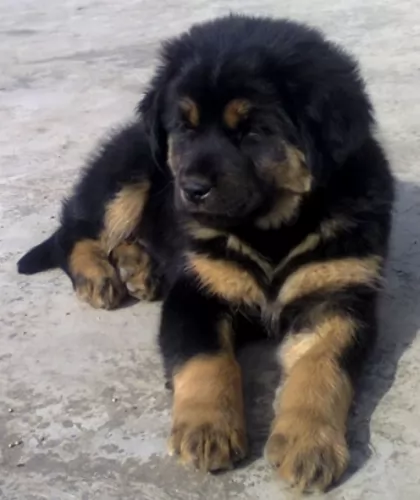 The Gaddi Kutta is a mastiff but he is athletic, has tremendous speed and stamina. He is muscular and deep-chested, leaner than most of the mastiff lines. Their ears can be either natural or cropped, on a very large head. One of the most important traits of the Gaddi Kutta is the massive, arched neck that protects them from predators. He is sturdy with a heavily feathered, thick tail curling over the back.
The Gaddi Kutta is a mastiff but he is athletic, has tremendous speed and stamina. He is muscular and deep-chested, leaner than most of the mastiff lines. Their ears can be either natural or cropped, on a very large head. One of the most important traits of the Gaddi Kutta is the massive, arched neck that protects them from predators. He is sturdy with a heavily feathered, thick tail curling over the back.
They are massive, wolf like dogs, fiery and huge but intelligent and faithful to their people. They are scary even when they are trying to be affectionate. The muzzle is strong, and the mane is thick. The Gaddi has long, heavy legs and very large feet that are feathered, making him even more intimidating.
There are two types of Gaddi Kutti – the longhaired and the shorthaired. The longhaired is the most common and has a fuller coat with long feathering on the tail, legs and chest and some feathering on the feet. They are all usually solid colors of yellow, fawn and cream or they could be piebald, brown or brindle. They have a woolly dense undercoat.
 The Icelandic Sheepdog is a smallish to medium sized dog standing at 40 to 45cm in height and he can weigh anything between 9 and 14kg.
The Icelandic Sheepdog is a smallish to medium sized dog standing at 40 to 45cm in height and he can weigh anything between 9 and 14kg.
His double coat can be short or long, straight or wavy and in a mix of colors such as grey and white or tan and white, black, tan and white, cream or chocolate. Even though they come in a number of predominant colors, these colors are always accompanied by white markings.
He has a longish muzzle, much like the wolf, giving him an alert, foxy appearance. He has a muscular, rectangular body with strong, straight legs with dewclaws on both the front and hind legs.
Your social, energetic dog will require socialization and training which does him the world of good, turning him into a well-adjusted, obedient dog.
He is an intelligent dog, and training him won't be difficult as he is eager to please. These are social dogs which love being part of the family and they don't like being left outside day after day with little human intervention. He is a lively, confident breed, gentle and not at all aggressive.
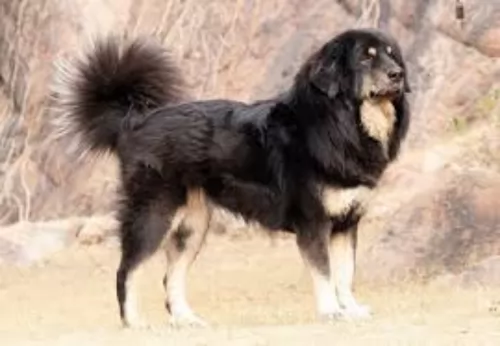 They are not always great with children, but they will protect own children in their family. Do not leave unattended.
They are not always great with children, but they will protect own children in their family. Do not leave unattended.
They have the ability to bring down a wolf or even a bear or snow leopard.
Because of his size, temperament and coat he is not very adaptable. He is good outside in a colder region and with a lot of land to roam, but not in a hot region or in an apartment.
This breed is very smart, learns quickly on his own.
 The Icelandic Sheepdog is such a good all-round family pet. He is alert, intelligent, social, playful, loyal, loving and brave.
The Icelandic Sheepdog is such a good all-round family pet. He is alert, intelligent, social, playful, loyal, loving and brave.
He is friendly too, getting on well with children and any pets you have in the home. He is essentially a working dog, so you shouldn’t think of owning him as a pet if your lifestyle is centered around the TV and the couch for the best part of the day.
This is an energetic dog who wants lots of action during the day. He is a dog that badly wants to be part of the family and in exchange for looking after him well, he’ll promise to be an exceptional pet.
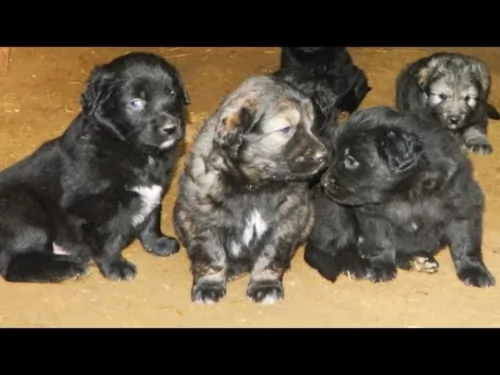 The breed is prone to obesity if they do not get enough exercise or a decent diet.
The breed is prone to obesity if they do not get enough exercise or a decent diet.
 Your pet will reach 12 to 14 years of age with good care and is regarded as a generally healthy dog breed. However, they can be prone to a few health conditions, and these include hip dysplasia and diabetes.
Your pet will reach 12 to 14 years of age with good care and is regarded as a generally healthy dog breed. However, they can be prone to a few health conditions, and these include hip dysplasia and diabetes.
Mercifully for your pet, diabetes is considered a manageable disorder. When your pet doesn’t produce insulin or can’t utilize it normally, his blood sugar levels rise, resulting in hyperglycemia.
If left untreated, your pet can land up with a host of complicated health problems. Diabetes can be classified as either Type 1 or Type II, with the more common form in dogs being Type 1.
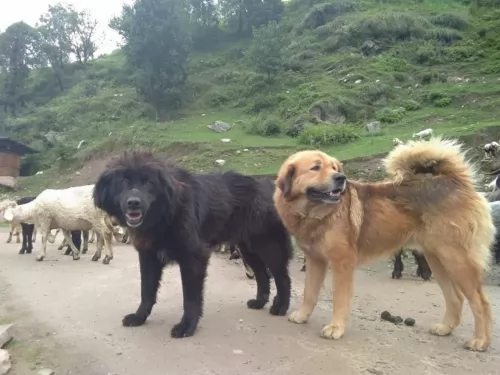 Should feed a high quality dry puppy food for large dogs. Give 1-2 cups per day split into 2-3 meals.
Should feed a high quality dry puppy food for large dogs. Give 1-2 cups per day split into 2-3 meals.
Again you want to feed high quality dry adult dog food for large dogs. Give 3-4 cups per day split into 2 meals. Watch for obesity and if your Gaddi Kutta is gaining too much weight, cut back.
The Gaddi Kutti seems to be immune to the most common of canine diseases.
This is a breed of very large dogs that need daily exercise by walking and running. However, since they have been fairly isolated in India and the Himalayas, he has not been exposed to organized dog play and exercise such as agility, dock jumping or field trials. He would probably succeed at all three.
 Feed your energetic Icelandic Sheepdog a diet which is appropriate for his age and activity level. Don't just feed him the best commercially manufactured dog food, but give him some cooked chicken, brown rice and vegetables mixed into his kibble as a tasty treat. Also, dogs are carnivores, so include some raw meat into his diet from time to time. Clean, cool water should always be available.
Feed your energetic Icelandic Sheepdog a diet which is appropriate for his age and activity level. Don't just feed him the best commercially manufactured dog food, but give him some cooked chicken, brown rice and vegetables mixed into his kibble as a tasty treat. Also, dogs are carnivores, so include some raw meat into his diet from time to time. Clean, cool water should always be available.
The Icelandic Sheepdog has a thick double coat, with the outer coat being longer and the hair being shiny and glossy. These dogs shed quite a bit with seasonal shedding too so twice-weekly brushing will be necessary to keep the fur free of loose hair. His nails should also be checked regularly and his teeth should be brushed a couple of times a week too.
Icelandic Sheepdogs are athletic, active dogs that require a lot of exercise to keep them in good physical shape.
He loves all kinds of games and outdoor activities, one of which will be going with you for a walk every day. He makes a wonderful companion for those people going on long hikes.